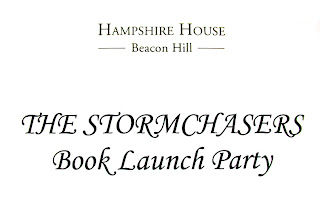The night kicked off with Jenna's reading at The Coolidge Corner Theater in Brookline. Braving Thursday afternoon rush hour traffic from Lowell to Brookline, Liz and I got to our seats just as Grub Street's Chris Castellani introduced Jenna onto the stage. Jenna was gracious and appreciative, thanking her many readers and supporters. She introduced The Stormchasers and read from chapter 20, which was a great introduction of the main character Karena, a woman searching for her bi-polar, storm chasing twin, Charles, whom she hasn't seen in twenty years.
The chapter details a pending storm through Karena's point of view while she heads off in a jeep with group of chasers. Jenna's vivid descriptions of how Karena, a novice chaser, witnesses the storm's build up while also catching sight of Charles for the first time in years was gripping and real. These storm details were no doubt a result of Jenna's extreme research techniques, which have amounted to storm chasing during the stormy spring months in the midwest over the past few years.
After she read, Jenna answered questions from the audience. Her various answers encompassed a terrifying experience she had while storm chasing (getting a flat just as a massive storm descended), confirming that there would indeed be some love elements in this new book, and explaining why she wrote The Stormchasers in the present tense: it's more immediate and visceral, and gives the reader the impression that nobody and nothing is safe whereas in third person there is an implication that, because the story is being told in a voice that is looking back, that it's possible things have worked out on a certain level. Whereas present tense destroys this supposed (and possibly subconscious) comfort zone for the reader.
After the reading Jenna signed books across the street at one of the best independent booksellers in the area, Brookline Booksmith. Having taken numerous classes with Jenna at Grub Street, it really was a joy to be at her reading and book signing.
After the signing, Liz and I went with writer and publicist Sharon Bially (whom we had chatted with while waiting in line at the signing) to dinner up Harvard Street to Khao Sarn Cuisine, a wonderful Thai restaurant (I recommend the Thai Garden Chicken). At one point I spied a whole table-full of fellow Jenna students (as well as bloggers from Beyond The Margins) off in the corner. Oh, serendipity.
Me and Leslie Greffenius:
But, tonight many familiar writer faces were out to help Jenna celebrate the chasing of the storms, including Henriette Lazaridis Power, Iris Gomez, Becky Tuch, Leslie Greffenius, Whitney Scharer, Kathy Crowley, Chris Abouzeid, Necee Regis, Cecile Corona, Nichole Bernier, Lisa Borders, Christiane Alsop (the newest blogger on Beyond the Margins), Stephanie Ebbert, Michelle Seaton, Javed Jahangir, Sonya Larson, and many others.
J.P., Chris, Kathy, Henriette, and a party crasher:
Henriette and Jenna:
It was a great launch for what promises to be one of this summer's most talked-about books. Have a great book tour, Jenna!















